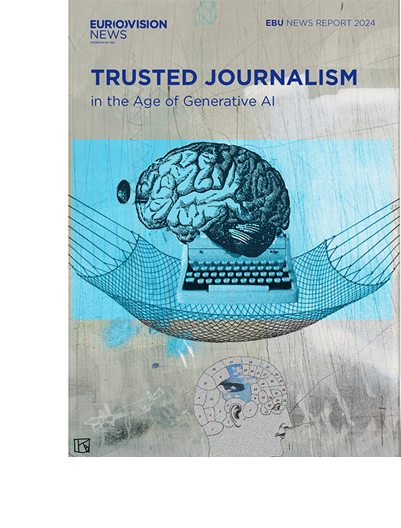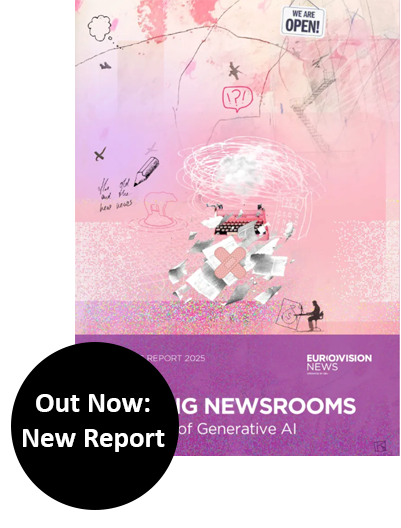Up to now, the world’s newsrooms have been populated by roughly two phenotypes. On the one hand, there have been the content people (many of whom would never call their journalism “content,” of course). These include seasoned reporters, investigators, or commentators who spend their time deep diving into subjects, research, analysis, and cultivating sources and usually don’t want to be bothered by “the rest.”
On the other hand, there has been “the rest.” These are the people who understand formats, channel management, metrics, editing, products, and audiences, and are ever on the lookout for new trends to help the content people’s journalism thrive and sell. But with the advent of generative AI, taking refuge in the old and surprisingly stable world of traditional journalism roles will not be an option any longer. Everyone in the newsroom has to understand how large language models work and how to use them — and then actually use them. This is why 2024 will be the year when media organizations will get serious about education and training.
“We have to bridge the digital divide in our newsrooms,” says Anne Lagercrantz, vice CEO of Swedish public broadcaster SVT. This requires educating and training all staff, even those who until now have shied away from observing what is new in the industry. While in the past it was perfectly acceptable for, say, an investigative reporter not to know the first thing about SEO, TikTok algorithms, or newsletter open rates, now everyone involved with content needs to be aware of the capabilities, deficiencies, and mechanics of large language models, reliable fact-checking tools, and the legal and ethical responsibilities that come with their use. Additionally, AI has all the potential to transform good researchers and reporters into outstanding ones, serving as powerful extensions to the human brain. Research from Harvard Business School suggested that consultants who extensively used AI finished their tasks about 25% faster and outperformed their peers by 40% in quality. It will be in the interest of everyone, individuals and their employers, that no one falls behind.
But making newsrooms fit for these new challenges will be demanding. First, training requires resources and time. But leadership might be reluctant to free up both or tempted to invest in flashy new tools instead. Many managers still fall short of understanding that digital transformation is more a cultural challenge than it is a tech challenge.
Second, training needs trainers who understand their stuff. These are rare finds at a time when AI is evolving as rapidly as it is over-hyped. You will see plenty of consultants out there, of course. But it will be hard to tell those who really know things from those who just pretend in order to get a share of the pie. Be wary when someone flashes something like the ten must-have tools in AI, warns Charlie Beckett, founder of the JournalismAI project at the London School of Economics. Third, training can be a futile exercise when it is not paired with doing. With AI in particular, the goal should be to implement a culture of experimentation, collaboration, and transparency rather than making it some mechanical exercise. Technological advances will come much faster than the most proficient trainer could ever foresee.
Establishing a learning culture around the newsroom should therefore be a worthwhile goal for 2024 and an investment that will pay off in other areas as well. Anyone who is infected with the spirit of testing and learning will likely stretch their minds in areas other than AI, from product development to climate journalism. So many of today’s challenges for newsrooms require constant adaptation, working with data, and building connections with audiences who are more demanding, volatile, and impatient than they used to be. It is important that every journalist embraces at least some responsibility for the impact of their journalism.
It is also time that those editorial innovators who tend to run into each other at the same conferences open their circles to include all of the newsroom. Some might discover that a few of their older colleagues of the content-creator-phenotype could teach them a thing or two as well — for example, how to properly use a telephone. In an age when artificial fabrication of text, voice, or image documents is predicted to evolve at a rapid pace, the comeback of old-style research methods and verification techniques might become a thing. But let’s leave this as a prediction for 2025.
This post was published in Harvard’s Nieman Lab’s Journalism Predictions 2024 series on 7th December 2023.




OXFORD – Depending on where you get your news, your view of how the impeachment inquiry into US President Donald Trump is unfolding may be very different from that of your friends, relatives, or neighbors. You may also think that any version of the story that conflicts with yours is simply untrue. This lack of consensus on basic facts – largely a byproduct of social media – carries serious risks, and not nearly enough is being done to address it.
In recent years, the need to improve “media literacy” has become a favorite exhortation of those seeking to combat misinformation in the digital age, especially those who would prefer to do so without tightening regulation of tech giants like Facebook and Google. If people had enough media savvy, the logic goes, they would be able to separate the wheat from the chaff, and quality journalism would prevail.
There is some truth to this. Just as it is dangerous to drive in a place where you don’t know the traffic laws, navigating the new digital-media environment safely – avoiding not only “fake news,” but also threats like online harassment, nonconsensual (“revenge”) porn, and hate speech – requires knowledge and awareness. Robust efforts to improve media literacy globally are thus crucial. Free, credible, and independent news media are a pillar of any functioning democracy, essential to enable voters to make informed decisions and to hold elected leaders accountable. Given this, media literacy must be pursued within a broader campaign to improve democratic literacy.
Since its invention in ancient Greece more than 2,500 years ago, democracy has depended on rules and institutions that strike a balance between participation and power. If the point was simply to enable everyone to speak up, platforms like Facebook and Twitter would be the pinnacle of democracy, and popular movements like the 2011 Arab Spring would naturally produce functioning governments.
Instead, the objective is to create a system of governance in which elected leaders bring to bear their knowledge and experience, in order to advance the interests of the people. The rule of law and the separation of powers, guaranteed by a system of checks and balances, are vital to the functioning of such a system. In short, mobilization means little without institutionalization.
And yet, today, public institutions are suffering from the same lack of trust as news media. To some extent, this is warranted: many governments have failed to meet their citizens’ needs, and corruption is rampant. This has fueled rising skepticism toward democratic institutions, with people often preferring ostensibly more egalitarian online platforms, where everyone’s voice can be heard.
The problem is that such platforms lack the checks and balances that informed decision-making demands. And, contrary to the early expectations of some Internet pioneers, those checks and balances will not emerge organically. On the contrary, tech companies’ algorithm-driven business models all but preclude them, because they amplify voices according to clicks and likes, not value or veracity.
Populist politicians have taken advantage of the lack of checks and balances to obtain power, which they often use to please their supporters, ignoring the needs of opponents or minority groups. This type of majority rule looks a lot like mob rule, with populist leaders trying to overrule legislatures and courts to fulfill the desires – often shaped by lies and propaganda – of their constituents. British Prime Minister Boris Johnson’s recent attempt to suspend Parliament, in order minimize its ability to prevent a no-deal Brexit, is a case in point.
In a democracy, all people must be able to trust their leaders to uphold their rights and protect their basic interests, regardless of whom they voted for. They should be able to go about their daily lives, confident that public officials will dedicate their time and energy to making informed decisions – and that those who don’t will be checked and balanced by the rest. Credible independent media support this process.
In Johnson’s case, the judiciary fulfilled its duty to check the executive. But with every assault on democratic institutions, accountability is weakened, people become more disillusioned, and the legitimacy of the system declines. Over time, this reduces the incentive for talented people to work in fields like journalism and politics, eroding their effectiveness and legitimacy further.
Breaking this vicious circle requires the rapid expansion of media and democratic literacy, including how the system works and who owns and shapes it. And yet, as a forthcoming study by the Council of Europe’s Expert Committee on Quality Journalism in the Digital Age (on which I served) shows, most existing media-literacy programs are limited to teaching schoolchildren how to use digital platforms and understand news content. Very few target older people (who are most in need), explain who controls media and digital infrastructure, or teach the mechanisms of algorithmic choice.
Democracies all over the world are enduring a stress test. If they are to pass, their institutional underpinnings must be reinforced. That requires, first and foremost, an understanding of what those underpinnings are, why they matter, and who is trying to dismantle them.
This commentary was published by Project Syndicate on November 28, 2019